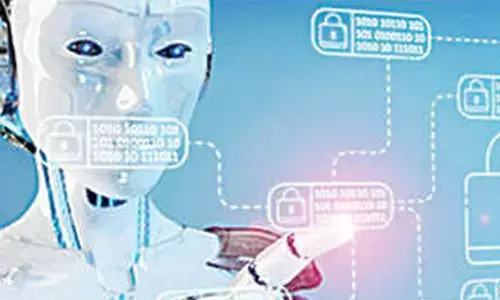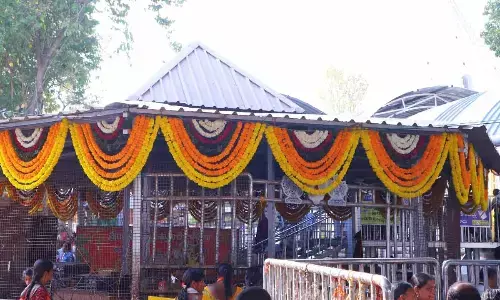Supreme Court whittles down Aadhaar

A fivejudge bench headed by Chief Justice Dipak Misra held that Aadhaar would be voluntary and not mandatory The majority judgment, which struck and read down or clarified various provisions of the Aadhaar Act, was read out by Justice A K Sikri speaking for Chief Justice Misra and Justice A M Khanwilkar and himself Justice Ashok Bhushan delivered a separate but concurring judgment
New Delhi: In a landmark judgement, the Supreme Court on Wednesday by a 4:1 majority judgement upheld the legality of Aadhaar for use only in government-funded social benefit schemes and PAN and Income Tax Return (ITR), while junking its requirement for mobile phone connections, bank accounts, school admissions and competitive examinations.
A five-judge bench headed by Chief Justice Dipak Misra held that Aadhaar would be voluntary and not mandatory. The majority judgment, which struck and read down or clarified various provisions of the Aadhaar Act, was read out by Justice A K Sikri speaking for Chief Justice Misra and Justice A M Khanwilkar and himself. Justice Ashok Bhushan delivered a separate but concurring judgment.
Rejecting the apprehensions of the petitioners, the majority judgment held that the architecture of Aadhaar as well as the provisions of the Aadhaar Act do not tend to create a surveillance state. "This is ensued by the manner in which the Aadhaar project operates."
In his dissenting judgement, Justice D Y Chandrachud held that the entire Aadhaar programme since 2009 suffered from constitutional infirmities and violated fundamental rights. The enactment of Aadhaar Act does not save the Aadhaar project. The Aadhaar Act, the rules and regulations framed under it and the framework prior to the enactment of the Act were unconstitutional.
"...if no fresh legislation has been enacted by the Union government in conformity with the principles which have been enunciated in this judgment, the data (collected for Aadhaar) shall be destroyed.” Justice Chandrachud said that passing the Aadhaar law as money bill was unconstitutional and a "fraud on the Constitution" because it was not a money bill.
Speaking for the majority, Justice Sikri said linking of Aadhaar for opening and with existing bank accounts, getting a mobile number, appearing for CBSE, NEET, JEE, UGC examinations and admission in schools was not mandatory.
The court in its 1,448-page judgement said the government's notification that rendered bank accounts inoperable for not being linked with Aadhaar amounted to depriving a person of his property rights. "We find that this move of mandatory linking of Aadhaar with bank account does not satisfy the test of proportionality," said the majority judgment.
The court in its majority judgment said that on attaining the age of majority, children enrolled under Aadhaar with the consent of their parents shall be given the option to exit from the Aadhaar project if they do not intend to avail the benefits of the government schemes.
The requirement of Aadhaar for admission of children to school will not be compulsory as it was "neither a service nor subsidy" and "a child between the age of 6 and 14 years has the fundamental right to education under Article 21A of the Constitution". The school admission cannot be treated as ‘benefit' as well, the verdict said.
However, the majority of the bench held that Aadhaar was valid for linking with Income Tax returns. The court also held that the "disclosure of information in the interest of national security could not be faulted with". However, it said that for the "determination of such an eventuality, an officer higher than the rank of a Joint Secretary should be given such power. Further, in order to avoid any possible misuse, a Judicial Officer (preferably a sitting High Court Judge) should also be associated with."
Striking down Section 57 of the Aadhaar Act that allows private entities to demand Aadhaar to access their services, the court said that there would not be sharing of data with individuals and the corporate entities. The court held that the telecom department circular of March 2017, mandating linking of mobile number with Aadhaar, was "illegal and unconstitutional as it is not backed by any law and is hereby quashed".
The verdict said that it was better to be unique than the best because being the "best makes you number one, but being unique makes you the only one". "Uniqueness is the fundamental difference between Aadhaar and other identity proofs.
There is a fundamental difference between Aadhaar and other identity proof as Aadhaar cannot be duplicated and it is a unique identification," it said. "Minimal demographic and biometric data of citizens are collected by UIDAI for Aadhaar enrolment. We are of the view that there are sufficient safeguards to protect data collected under Aadhaar scheme," stated the judgment.
"No person will be denied benefits under social welfare scheme because of failure of authentication through Aadhaar," the court said. "We direct the government to ensure that illegal migrants are not issued Aadhaar to get benefits of social welfare schemes."










